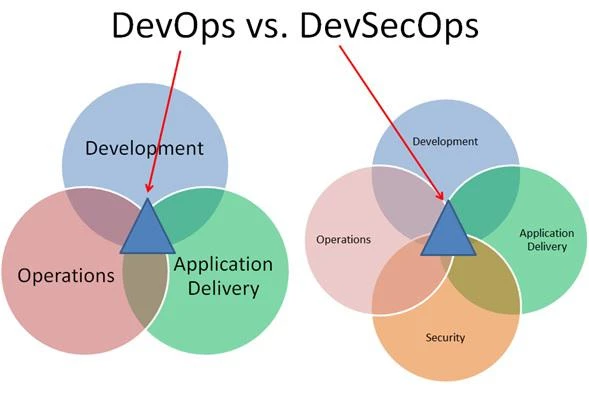DevOps is not only about software development and operations. To make complete utilization of the flexibility in DevOps approach, it is desirable for software developers to integrate IT security at every step during a software’s life cycle. It is, in essence, what DevSecOps is.
Exploring Further – What is DevSecOps?
DevSecOps works on the premise that security of a software system is a joint responsibility of everyone involved in its development. Understandably then, security must be ensured, and practices followed at every step in the software’s development cycle.
DevSecOps is a set of practices that embed security early on in a software’s development, rather than thinking about it in the testing phase- where products are more or less entirely realized.
To reach higher security standards, development teams need to teach security as one of the keys and ongoing practices of software development. DevSecOps is a full-stack approach to embedding security within any software, right from the start until the end.
DevSecOps helps leverage the continuous software life cycle of DevOps and makes early discovery and fixing of security flaws possible.
Why is DevSecOps The Future of Software?
Better security standards are crucial for businesses and institutions to achieve given the fatal risks posed by latest software deployed on the cloud and readily and widely available to masses.
Stringent security policies would only mean lesser risks of data compromises and potential brand spoil further down the road.
IT security practices such as secure coding and DevSecOps highlight the need for security in today’s IT landscape. Breach Level Index findings for the first half of 2018 are appalling.
Out of a total of 945 data breaches worldwide that compromised 4.5 billion data records, over a billion records were exposed in India alone. The report cited the Aadhar breach incident in India which revealed the name, address, and other personal details of citizens.
We are on the path to a ‘Digital India,’ undoubtedly. But, are we ready to walk it? Security practices like DevSecOps will make sure our steps toward a digital India don’t backfire with data breaches.
How are Security Enthusiasts Practising DevSecOps?
Here are the top 5 best practices for DevSecOps software developers and designers can implement-
- Automate Tests – DevOps rests its foundation on the speed of development and deployment. To include security as an integral part of DevOps, security tests need to be automated. Persistent automated testing will boost the pace of flaw mitigation and repair for enterprises.
- Consider Code Dependencies – Today, organizations are heavily using open-source software integrations to put together a software rather than having to reinvent the wheel. The practice comes along with a host of undiscovered vulnerabilities from integrated apps. Consider checking code dependencies and setting up automated processes to test the security of the open-source code.
- Use the Right Tools – Security testing tools should be taken with a pinch of salt. Since most of them are emerging, it is advisable to not rely on them entirely. Moreover, software should be tested one small chunk at a time to eliminate delay in testing and leaving developers with a lot to fix at once.
- Model your Threats – Threat modeling and risk analysis is a crucial step before turning to DevSecOps. Gain awareness of your assets, the possible threats to these assets, and how they can be combated. Then, you are in a better position to prioritize DevSecOps tasks, so you are always working on the highest priority bug.
- Implement Secure Coding – Training your software development team on secure coding is the best thing you can do this year. This way, your teams will reduce application-level vulnerabilities and make DevSecOps achievable for your enterprise. Enroll your developers to learn how to code securely. Learn more about secure coding here.
Bug-Proof Systems with DevSecOps
Install a test-driven development environment and integrate automated testing and continuous tests as part of the software development lifecycle. By employing DevSecOps for software development, organizations can seamlessly improve their code quality and gauge user data (and their trust) from getting compromised.
DevOps apps on one hand score when it comes to speed, agility, scale, and features, but lag behind in robust security. DevSecOps is the missing piece in the puzzle which promises a secure infrastructure and a complete app based on strong security base.
Organizations Implementing DevSecOps and Winning!
CA Veracode’s State of Software Security report published this year in late October measured trends in flaw remediation and mitigation. The study showed that organizations that use DevSecOps address flaw faster than those who don’t.
Active DevSecOps implementations allow enterprises to repair flaws over 11.5 times quicker since DevSecOps consists of regular security checks throughout software builds and production updates.
The study also revealed that 85% of the apps it took into account have at least one vulnerability, but also that implementing DevSecOps is the surest and best way to ensure app security.
Aditya Khullar from the technical cybersecurity team at PayTM, India’s leading mobile wallet, believes that implementing DevSecOps can be a challenge, but it is one worth taking.
Khullar adds that his firm shifted from DevOps to DevSecOps to maximize the speed at which they deliver services, while also ensuring complete security. Earlier, they had to wait to market their product until they were entirely sure of its security- a hurdle that eliminates with DevSecOps.
See Them Coming- Trends in DevSecOps
Zero-touch testing automation looks like the future of DevSecOps as organizations strive to reduce their development times and yet build more secure software systems. Applying test automation between the DevOps stages will allow teams to undertake security tests proactively.
Moreover, organizations will expect development, operations, and IT security teams to collaborate effectively and efficiently, and more often. DevSecOps would be a result of this collaboration and only when teams work toward common goals can secure apps be designed.
DevSecOps is coming for you. Get ready to transform your software development process and introduce security as a critical aspect throughout the cycle. Make sure your teams are equipped to handle DevSecOps and its implementation in your organization.
Enroll your development, operations, and security teams into a comprehensive training for Practical DevSecOps by Mohammed Imran & Hari Valugonda at nullcon Goa 2019, a conglomeration of security enthusiasts. Learn more about it here.
– Written by Divya Agrawal & Edited by Pratik Ghumade for nullcon
Expert Opinion: Aditya Khullar




